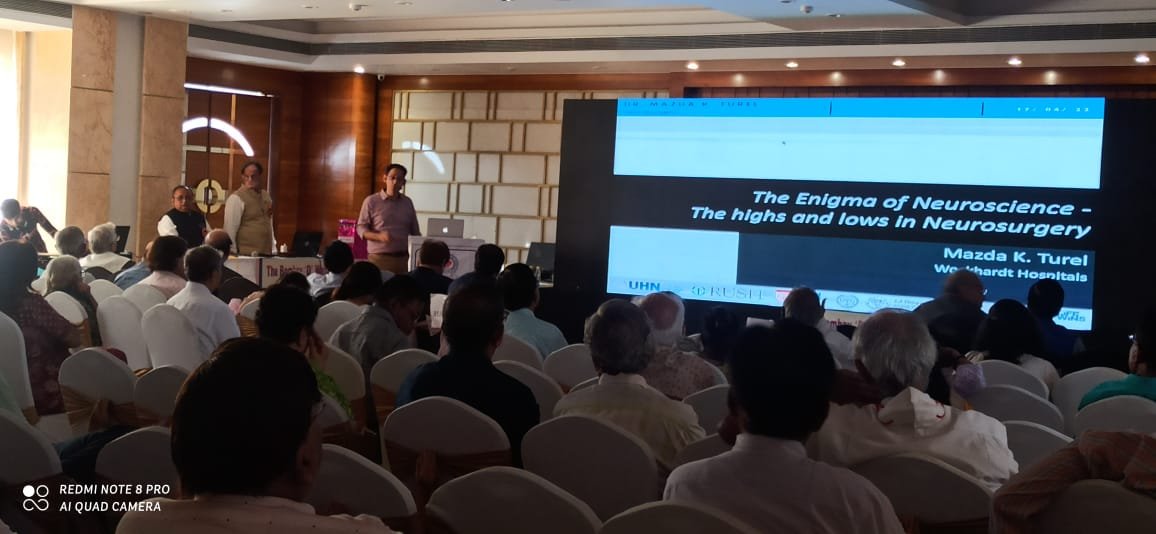Revisiting scenes from a conference where the mysteries of the mind and body took centre stage
“Can you hear me?” I asked a live audience, testing my mic out. After more than a year, I was delivering a guest lecture in person to a bunch of general physicians. Mechanically, I followed my question with the customary “Can you see me?” – a hangover from the innumerable Zoom talks I’ve delivered in the recent past during the pandemic, which now threatens to behave like an ex-girlfriend: over but not over.
The Indian Medical Association has various branches, and each ward in the city has its own division that organizes activities for its physicians. Doctors from various specialties are invited to impart wisdom on updates in their areas of expertise so that general physicians (who, I believe, are the backbone of our profession) may be empowered to guide their patients in cases beyond their realm of proficiency.
We had specialists come up and talk to us on advances in laparoscopic surgery, robotic knee replacement, precision angioplasty, minimally invasive bypass surgery, artificial intelligence guided endoscopy and in-vitro fertilization along with a few more to cover the entire spectrum of human afflictions. I found it a bit ironic that the talk on premature ejaculation was the last talk of the day – or maybe it was a smart move by the organizers to ensure that everyone ‘stayed till the end’!
My talk was somewhere in the middle. Not wanting to seem left behind in comparison with all the awe-inspiring accomplishments and developments in the other fields, I enlightened the crowd that even neurosurgery has advanced to including keyhole surgery, as minimally invasive surgery is fashionably called. Imagine, if you will, peeping into the keyhole of a door where the entry is pinpoint but the view is panoramic. I explained that by using an endoscope, we can enter the brain through the nose, the eye, and even from behind the ear. I also cautioned them from imagining any other orifice, which, I’m sure, awakened the post-lunch crowd, although technically, one can enter the brain through a puncture in the groin by guiding wires through blood vessels – what is fondly known as endovascular surgery.
As brain and spine surgeons, we have the luxury to take a peek into someone’s brain and spinal cord on a daily basis, and every time it only gets more fascinating. With a pristine picture of the brain, I explained to the gathering that it is mindboggling to fathom that there are 100 billion neurons in the average brain, constituting a complex network of trillions of synapses which we can keep building (even by playing Wordle or Sudoku). These neurons interact with each other and from this activity emerges the whole spectrum of abilities that we call human nature and human consciousness.
When we neurosurgeons meet at conferences, our discussions often revolve around how to best preserve human consciousness in its truest sense, not simply a state of wakefulness. Often, when we remove tumours from certain areas of the brain, patients who outwardly appear to have a seemingly perfect existence may feel like they’ve been rewired. Something shifts within them that we are sometimes unable to decipher and heal. This is akin to patients having neurogenerative conditions such as Alzheimer’s and Parkinson’s, who switch to becoming bleak shadows of themselves within a few months of the onset of their illness.
In the past five years, the progress made in neuroscience equates that made in the past five decades, and yet, it is the simplest questions that sometimes confound us. Like when a patient with a brain tumour asks, “Why me?” I am unable to give a satisfactory answer; indeed, why does anything happen to anyone? I could just as simply ask, “Why not you?” – a question I ask myself when something goes wrong – but it isn’t fair to expect someone to introspect at such a time.
Another popular question I get asked is, “Is this a small operation?” My response to that is always, “Even though I’ve done this several times over, I don’t consider any surgery as minor.” There is a reason for this; in fact, I have just finished attending a symposium with surgeons across the world on Major Complications from Minor Surgeries. Considering the complexity of the human body, it is unbelievable how many things can go awry. It is even more perplexing when they don’t.
At a conference several years ago, a surgeon put up a case scenario and asked his colleagues if they would recommend the proposed simple surgery to a patient who had come to them. All of us raised our hands in agreement. Then he asked a follow-up question. “If this was you, would you have this operation?” Unsurprisingly, most of us kept our hands down. The conflict of dichotomy comes from knowing what can go wrong, even though most often it doesn’t. As the famous saying goes, “No one sees what you see, even if they see it too.”
I demonstrated the fact of that statement during my talk by putting up an optical illusion of a picture of a shoe. Half the crowd perceived it to be pink and white in colour, while the other half imagined the exact same shoe to be green and grey – and both halves refused to accept that any other colour could be present. The science behind this was that the colour visualized by someone was dependent on the area of the brain being used to process it.
I finished my talk to thunderous applause and then like you rightly guessed stayed back for the last talk of the day, the one on premature ejaculation by a urologist. Most men in the audience were relieved to note that the latest definition has abolished the time criteria of 2 minutes (which had subsequently also been reduced to 1 minute) and now only takes into consideration one’s partner’s satisfaction, which, for the ‘longest time’ did not feature in the treatment of this condition. Like always, it required a female doctor to change the course of mankind. It is not without reason that the famous British writer Virginia Woolf once said, “For most of history, anonymous was a woman.”
Surgical conferences, much like the field of academia, form the bedrock of knowledge in our profession. They foster an atmosphere of learning and wisdom, a place where we may announce the latest breakthroughs in the field, share our experiences, and ruminate on the mysteries we have yet to solve. Most of all, they strengthen what we all know and must never forget: that we are here to serve mankind, and to that, there can be no greater purpose.





